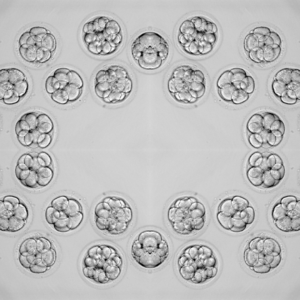08 May JUDGE RULES HUMAN EMBRYOS ARE NOT FROZEN ASSETS – THE PRICE OF EGGS KEEPS GOING UP
A Virginia judge has ruled that human embryos are not chattel goods, or personal property subject to division.
Jason and Honeyhline Heidemann were a married couple who began in vitro fertilization (IVF) in 2015. At that time, they entered into an agreement on embryo ownership of the 4 human embryos. One of the embryos was successful and became a child of the couple. The other 2 are frozen.

In 2018, Jason and Honeyhline entered into a Voluntary Separation and Property Settlement Agreement which was incorporated into their divorce decree. The agreement said that neither party could remove the frozen embryos from the Genetics & IVF (GIVF) Institute unless there was a court order or both parties agreed.
After the divorce, Honeyhline asked Jason for the 2 embryos so she could have more children. He did not consent. In 2019, Honeyhline then reopened the divorce and filed a Motion to Determine Disposition of Cryopreserved Human Embryos. Her motion was dismissed at the request of Jason.
Honeyhline then sued for partition under an old Virginia law seeking the possession of the embryos. The old law states “When an equal division of goods or chattels cannot be made in kind among those entitled, a court of equity may direct the sale of same, and the distribution of the proceeds accordingly to the rights of the parties”. Honeyhline cited that law in addition to the Separation & Settlement Agreement and the Embryo Ownership Agreement as evidence and a February 2023 Opinion Letter of a judge finding that human embryos could be considered as “goods or chattel”.
The court disagreed with the Opinion Letter stating it was non-binding authority, and it relied on an outdated law that permitted the partition of slaves. The analogy was that if slaves could be partitioned and sold, then so could human embryos. The court took issue with the old law which pre-dated the 13th amendment to the US Constitution which abolished slavery. It said personal property (not attached to land) could be partitioned – but not human embryos. The court stated that although the old law was never amended after abolition, the state legislature in 2007 issued “profound regret” for “involuntary servitude of Africans”. The court reasoned the legislative intent is since there is no longer slavery (where slaves could be sold or partitioned), then this should by extension apply to human embryos.
The next point of contention was if the agreement of the parties (the agreement with GIVF and the Separation Agreement of the parties) should dictate whether the human embryos should be treated as personal property. Honeyhline argued the parties listed the human embryos as “personal property” subject to division and the settlement agreement should be enforceable. However, the court stated that neither agreement referenced partition. As a result, it reasoned the agreements did not contemplate classification of human embryos as goods or chattel subject to partition.
Although the state law allows the court to equitably distribute ownership and value of tangible and intangible property, the court determined the law does not address distribution of genetic material.
Previously there was a court case that determined pre-embryos are a special type of marital property subject to distribution that recognized autonomy over reproductive decision-making and constitutional rights. In that case, both parties and the court agreed that human embryos are a special type of property and the Court of Appeals did not say that human embryos were personal property. The court also pointed out that other jurisdictions have suggested embryos are not property, but instead biological human beings that cannot be bought or sold and give rise to parental rights. It is interim category that entitles to special respect due to the potential for human life. It is ownership interest with respect to disposition as opposed to a property interest.
Finally, the court determined the code for partition was primarily for the division of real estate. Human embryos were not a consideration when the law was passed years ago. The court stated the unique nature of each human embryo cannot be bought or sold as each is priceless. The law required the ability to sale and the parties could not agree on a value. Jason thought they were “priceless” and Honeyhline valued the embryos at the cost of creation and storage. The court rejected Honeyhline’s proposal. The embryos were graded differently. No court in the state has accepted the “cost of creation” valuation method previously. In addition, the court stated that the sale of human embryos is unethical in that field (unlike the equitable division law) as embryos are too close to being human beings. The court said no court case in the country exists to facilitate the sale of human embryos as partition of human embryos were impractical since each embryo is a unique biological entity. Thus, the division is unworkable under current law according to the court when it dismissed the case.
Seven states have defined human embryos as a “person” and therefore expanding on the logic that you can’t split the baby. In other states, there could still be a determination the human embryos are personal property. Thus, the jurisdiction in which one lives may determine if human embryos could pass by will or trust or whether subject to partition in a divorce.
If interested in learning more about this article or other estate planning, Medicaid and public benefits planning, probate, etc., attend one of our free upcoming Estate Planning Essentials workshops by clicking here or calling 214-720-0102. We make it simple to attend and it is without obligation.










